2024年中考英语难点语法突破时间状语从句讲义
文档属性
| 名称 | 2024年中考英语难点语法突破时间状语从句讲义 |
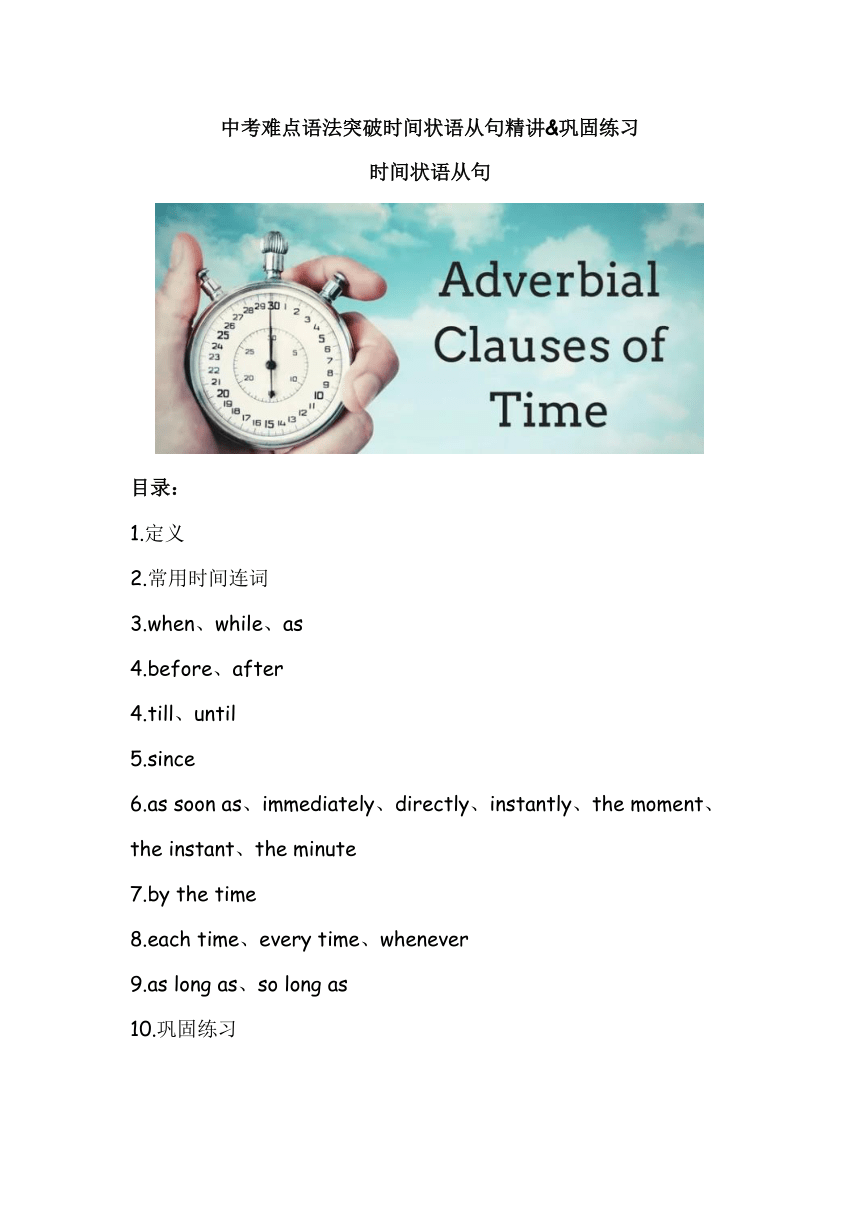
|
|
| 格式 | docx | ||
| 文件大小 | 378.8KB | ||
| 资源类型 | 教案 | ||
| 版本资源 | 通用版 | ||
| 科目 | 英语 | ||
| 更新时间 | 2024-05-14 07:12:18 | ||
图片预览

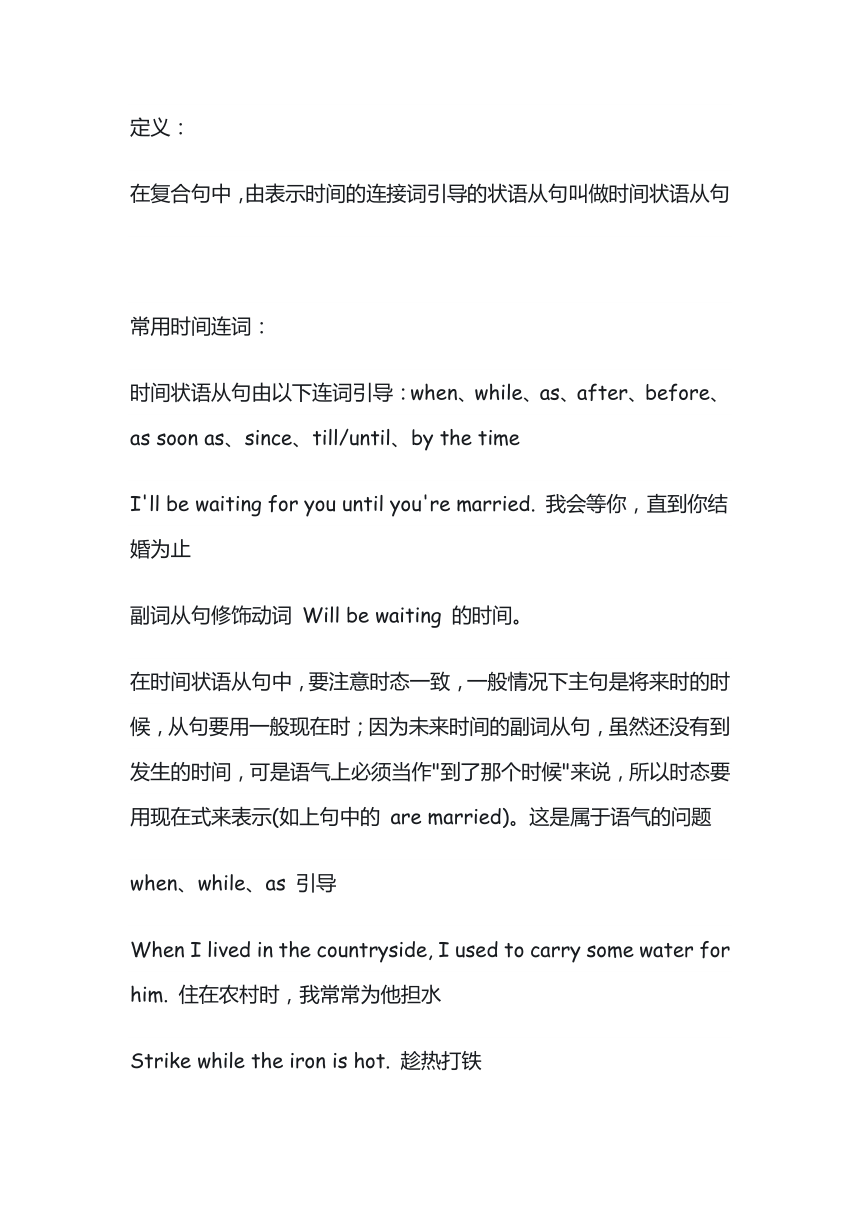
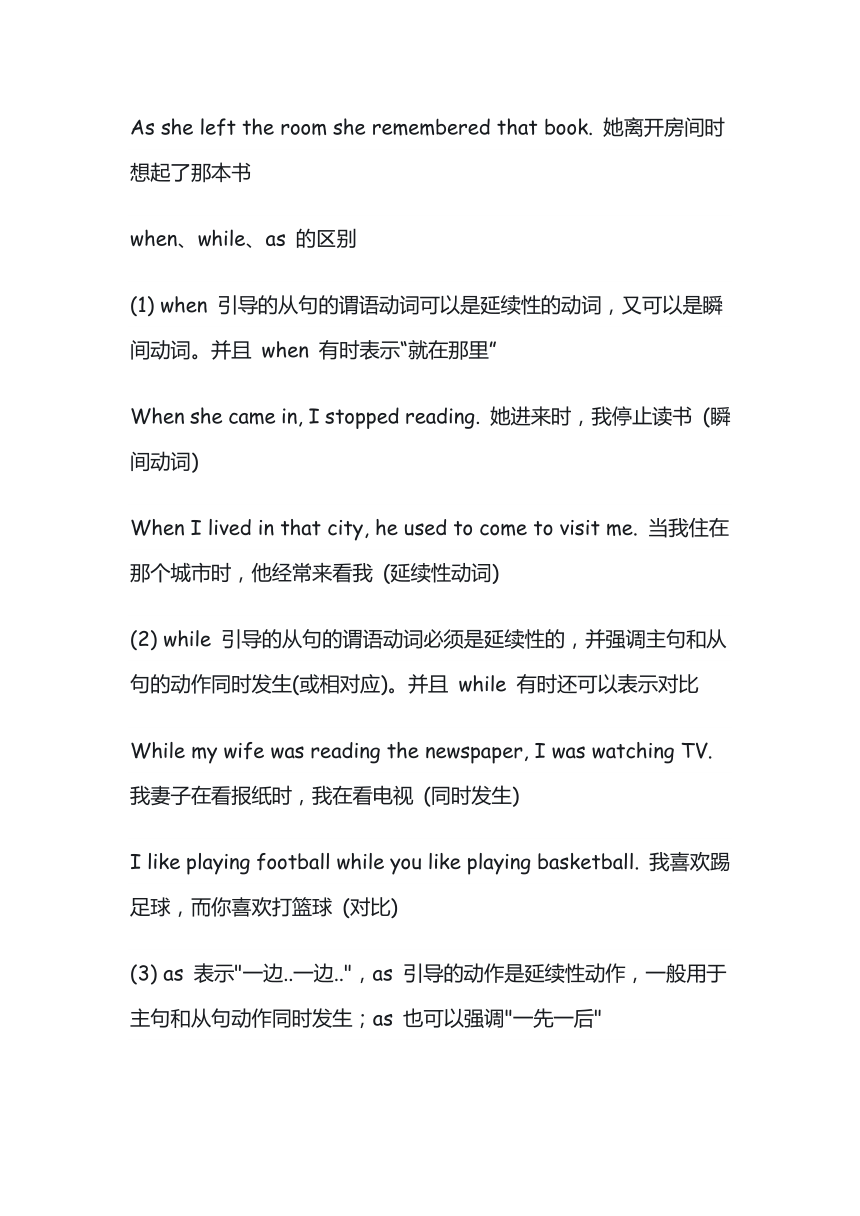
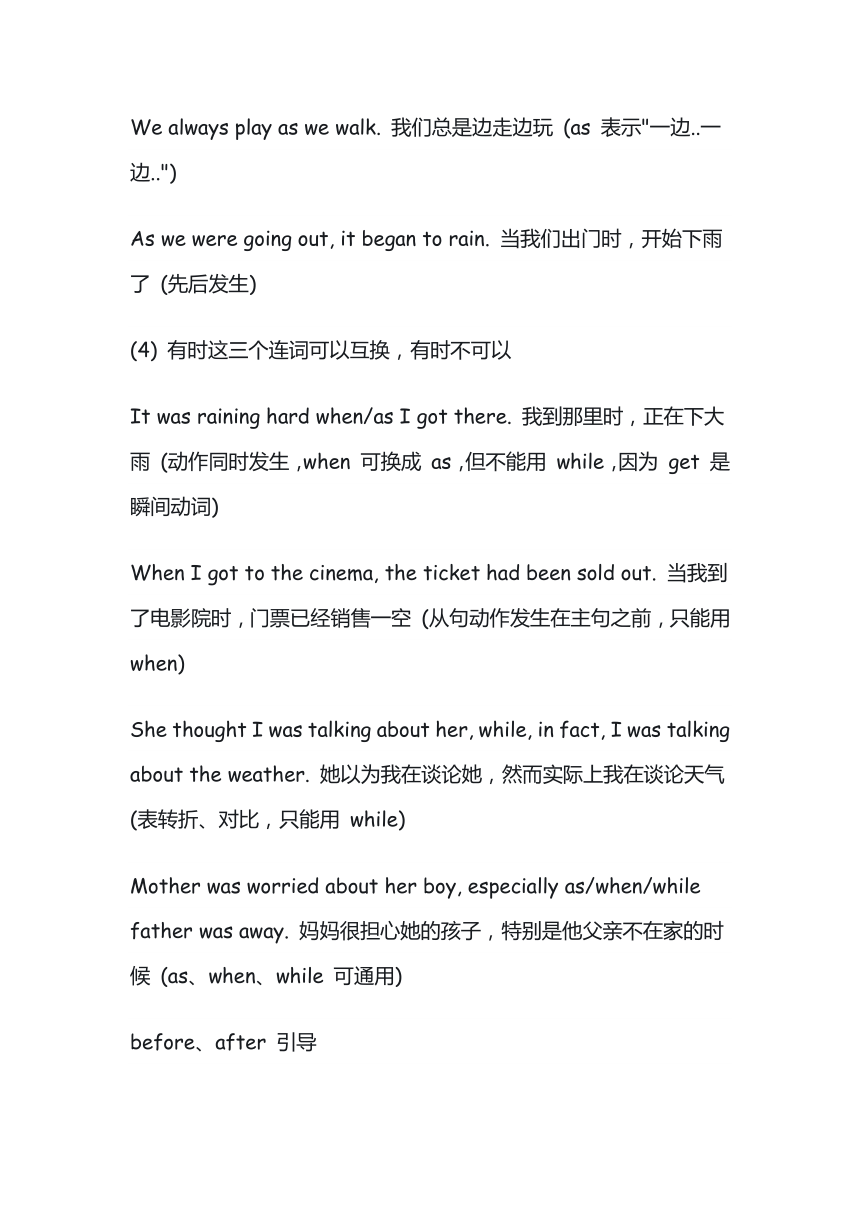
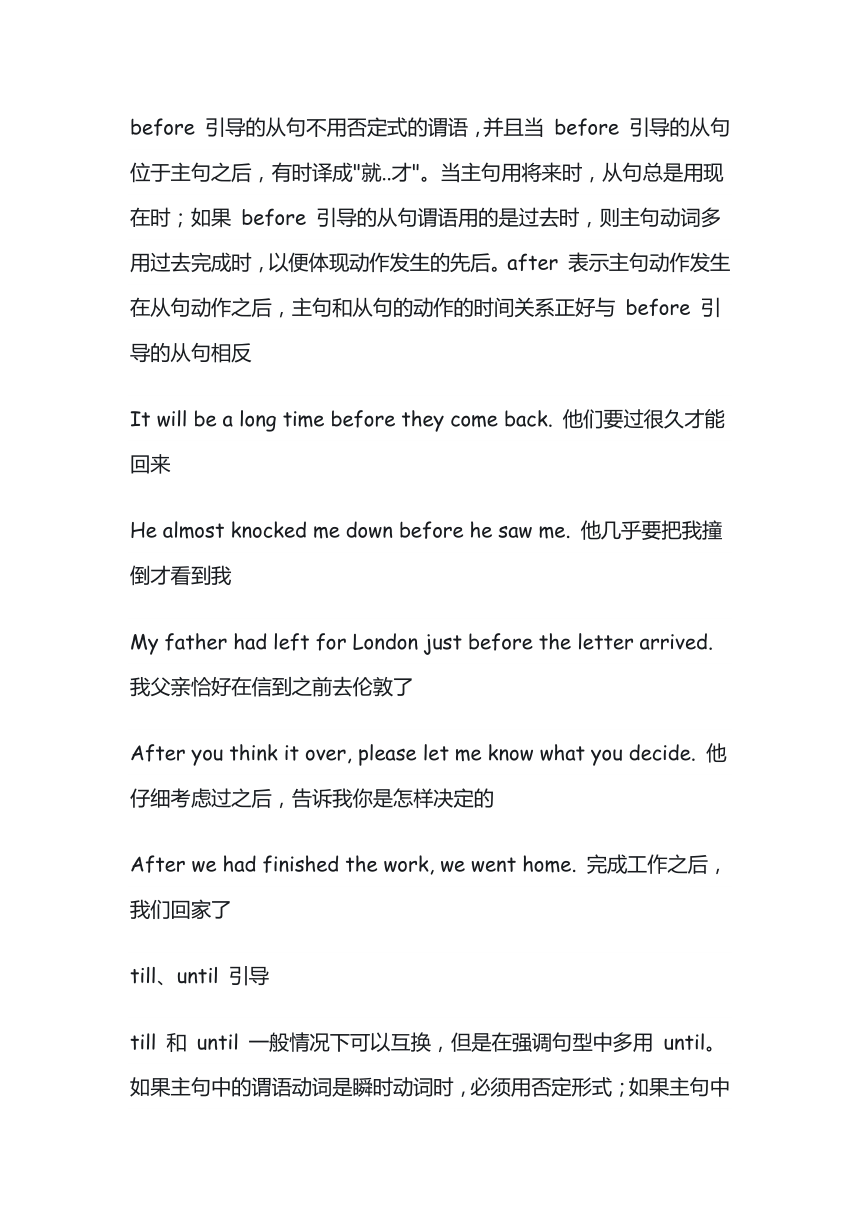
文档简介
中考难点语法突破时间状语从句精讲&巩固练习
时间状语从句
目录:
1.定义
2.常用时间连词
3.when、while、as
4.before、after
4.till、until
5.since
6.as soon as、immediately、directly、instantly、the moment、the instant、the minute
7.by the time
8.each time、every time、whenever
9.as long as、so long as
10.巩固练习
定义:
在复合句中,由表示时间的连接词引导的状语从句叫做时间状语从句
常用时间连词:
时间状语从句由以下连词引导:when、while、as、after、before、as soon as、since、till/until、by the time
I'll be waiting for you until you're married. 我会等你,直到你结婚为止
副词从句修饰动词 Will be waiting 的时间。
在时间状语从句中,要注意时态一致,一般情况下主句是将来时的时候,从句要用一般现在时;因为未来时间的副词从句,虽然还没有到发生的时间,可是语气上必须当作"到了那个时候"来说,所以时态要用现在式来表示(如上句中的 are married)。这是属于语气的问题
when、while、as 引导
When I lived in the countryside, I used to carry some water for him. 住在农村时,我常常为他担水
Strike while the iron is hot. 趁热打铁
As she left the room she remembered that book. 她离开房间时想起了那本书
when、while、as 的区别
(1) when 引导的从句的谓语动词可以是延续性的动词,又可以是瞬间动词。并且 when 有时表示“就在那里”
When she came in, I stopped reading. 她进来时,我停止读书 (瞬间动词)
When I lived in that city, he used to come to visit me. 当我住在那个城市时,他经常来看我 (延续性动词)
(2) while 引导的从句的谓语动词必须是延续性的,并强调主句和从句的动作同时发生(或相对应)。并且 while 有时还可以表示对比
While my wife was reading the newspaper, I was watching TV. 我妻子在看报纸时,我在看电视 (同时发生)
I like playing football while you like playing basketball. 我喜欢踢足球,而你喜欢打篮球 (对比)
(3) as 表示"一边..一边..",as 引导的动作是延续性动作,一般用于主句和从句动作同时发生;as 也可以强调"一先一后"
We always play as we walk. 我们总是边走边玩 (as 表示"一边..一边..")
As we were going out, it began to rain. 当我们出门时,开始下雨了 (先后发生)
(4) 有时这三个连词可以互换,有时不可以
It was raining hard when/as I got there. 我到那里时,正在下大雨 (动作同时发生,when 可换成 as,但不能用 while,因为 get 是瞬间动词)
When I got to the cinema, the ticket had been sold out. 当我到了电影院时,门票已经销售一空 (从句动作发生在主句之前,只能用 when)
She thought I was talking about her, while, in fact, I was talking about the weather. 她以为我在谈论她,然而实际上我在谈论天气 (表转折、对比,只能用 while)
Mother was worried about her boy, especially as/when/while father was away. 妈妈很担心她的孩子,特别是他父亲不在家的时候 (as、when、while 可通用)
before、after 引导
before 引导的从句不用否定式的谓语,并且当 before 引导的从句位于主句之后,有时译成"就..才"。当主句用将来时,从句总是用现在时;如果 before 引导的从句谓语用的是过去时,则主句动词多用过去完成时,以便体现动作发生的先后。after 表示主句动作发生在从句动作之后,主句和从句的动作的时间关系正好与 before 引导的从句相反
It will be a long time before they come back. 他们要过很久才能回来
He almost knocked me down before he saw me. 他几乎要把我撞倒才看到我
My father had left for London just before the letter arrived. 我父亲恰好在信到之前去伦敦了
After you think it over, please let me know what you decide. 他仔细考虑过之后,告诉我你是怎样决定的
After we had finished the work, we went home. 完成工作之后,我们回家了
till、until 引导
till 和 until 一般情况下可以互换,但是在强调句型中多用 until。如果主句中的谓语动词是瞬时动词时,必须用否定形式;如果主句中的谓语动词是延续性动词时,用肯定或否定形式都可以,但表达的意思不同
I didn't wake up until I heard the alarm clock. 直到听到闹钟的铃声我才醒来
Will this fish keep until tomorrow 这鱼能留到明天吗?
She didn't go to bed until her daughter came back. 她一直等到女儿回来才去睡觉
Please wait until I arrive. 在我到达之前请等我
since 引导
since 引导的从句的谓语动词可以是延续性的动词,也可以是瞬间动词。一般情况下,从句谓语动词用一般过去时,而主句的谓语动词用现在完成时。但在 It's + 时间 + since 从句的句型中,主句多用一般现在时
She moved to London last May and has since got a job at a newspaper. 她去年 5 月搬家到伦敦,此后一直到报社工作
She has been living a hard life since her husband died. 她自从丈夫死后,一直过着艰苦的生活
It was the first time I'd won since I'd learnt to play chess. 自从我学会下国际象棋以来,这是我第一次赢
It's ten years since they married. 他们结婚到现在已经 10 年了
as soon as、immediately、directly、instantly、the moment、the instant、the minute 等引导
以上这些连词都表示 “一...就...”
I came instantly I saw the need. 我一发觉有必要,就马上来了
I want to see her the moment she arrives. 她一到,我就要见她
I'll write you as soon as I get there. 我一到那儿,就给你写信
hardly/scarcely/rarely、when/before、no sooner.. than 相当于 as soon as 之意。主句用过去完成时,从句用一般过去时。当 hardly、scarcely、no sooner 位于句首时,主句用倒装语序
I had no sooner gone out than it began to rain. 我刚走到外面就开始下雨了
No sooner had she seen him than she smiled. 她一见到他就笑
Hardly had the game begun when it started raining. 比赛刚刚开始就下起雨来
We had hardly begun our walk when it began to rain. 我们刚一举步就下起雨来
by the time 引导
一般情况下,如果从句的谓语动词用一般过去时,主句的谓语动词用过去完成时;如果从句的谓语动词用一般现在时,主句的谓语动词用将来完成时
By the time I got there, the bus had already gone. 我到那里时,公交车已经开走了
By the time you come to see me tomorrow, I would have finished my job. 明天你来看我时,我应该已经做完工作了
each time、every time、whenever 引导
Each time she moved her head she let out a moan. 她每转一下头,就发出一声呻吟
I feel sick every time when I see such food. 每次看到这种食物,我都会感到恶心
I'd like to see you whenever it's convenient. 在你方便时我想来看看你
as long as、so long as 引导
以上连词表示“有多久...就多久”,通常译为“只要”
I don't mind as long as it doesn't rain. 只要不下雨就行了
So long as I live, I must study. 只要还活着,我就要学习
巩固练习
1.He was told that it would be at least three more months ____ he could recover and return to work.
A. when
B. before
C. since
D. that
正确答案:B
2. Why didn't you tell him about the meeting
He rushed out of the room ____ I could say a word.
A. before
B. until
C. when
D. after
正确答案:A
3. It is difficult for us to learn a lesson in life ____ we've actually had that lesson.
A. until
B. after
C. since
D. when
正确答案:A
4. What was the party like
Wonderful. It's years ____ I enjoyed myself so much.
A. after
B. before
C. when
D. since
正确答案:D
5. They ____ friends since they met in Shanghai.
A. have made
B. have become
C. have been
D. have turned
正确答案:C
二.根据句意,用合适的连词补全句子,使其意思完整。1.Mother was doing some cleaning_____father was watching TV.2.She danced_____she sang.3.He waited for me_____I came back home.4.He couldn't help crying_____he heard the bad news.5.It has been ten years_____they left Shanghai.6._____the doctor was checking her, she suddenly remembered the photo.7.I'll send an e-mail to you_____I get to London.8.Lucy didn't fall asleep_____her parents returned last night.9.Do you turn off the lights_____you leave the room 10._____I was reading in the room, the
telephone rang.
答案:1.while 2.as 3.until 4.when 5.since 6.As 7.as soon as 8.until 9.when 10.While
三.句子翻译。
1.自从她来到上海,她就在这家医院工作。
2.每天吃饭前,我们必须洗手。
3.当天气好的时候,我们通常出去散步。
4.当学生们在教室看书时,老师进来了。
5.当天黑时,他们到家了。
6.她昨天一直等到我们完成了这项工作。
7.我一到广州就会给你们发邮件。
8.他们踢完足球后,就开心地回家了。
9.当他们吃野餐时,天突然下起了雨。
10.自从我们住在这里,我们就交了很多朋友。
答案:1.She has worked in this hospital since she came to Shanghai.
2.We must wash hands before we have meals every day.
3.When it is fine, we usually go for a walk.
4.While the students were reading in he classroom, the teacher came in.
5.As it was getting dark, they arrived/got/reached home.
6.She waited until we finished this work yesterday.
7.I will send email to you as soon as I get to/reach/arrive in Guangzhou./I will send you email as soon as I get to/reach/arrive in Guangzhou.
8.They went home happily after they played football.
9.While they were having a picnic, it suddenly began/started to rain.
10.We have made many friends since we lived here.
时间状语从句
目录:
1.定义
2.常用时间连词
3.when、while、as
4.before、after
4.till、until
5.since
6.as soon as、immediately、directly、instantly、the moment、the instant、the minute
7.by the time
8.each time、every time、whenever
9.as long as、so long as
10.巩固练习
定义:
在复合句中,由表示时间的连接词引导的状语从句叫做时间状语从句
常用时间连词:
时间状语从句由以下连词引导:when、while、as、after、before、as soon as、since、till/until、by the time
I'll be waiting for you until you're married. 我会等你,直到你结婚为止
副词从句修饰动词 Will be waiting 的时间。
在时间状语从句中,要注意时态一致,一般情况下主句是将来时的时候,从句要用一般现在时;因为未来时间的副词从句,虽然还没有到发生的时间,可是语气上必须当作"到了那个时候"来说,所以时态要用现在式来表示(如上句中的 are married)。这是属于语气的问题
when、while、as 引导
When I lived in the countryside, I used to carry some water for him. 住在农村时,我常常为他担水
Strike while the iron is hot. 趁热打铁
As she left the room she remembered that book. 她离开房间时想起了那本书
when、while、as 的区别
(1) when 引导的从句的谓语动词可以是延续性的动词,又可以是瞬间动词。并且 when 有时表示“就在那里”
When she came in, I stopped reading. 她进来时,我停止读书 (瞬间动词)
When I lived in that city, he used to come to visit me. 当我住在那个城市时,他经常来看我 (延续性动词)
(2) while 引导的从句的谓语动词必须是延续性的,并强调主句和从句的动作同时发生(或相对应)。并且 while 有时还可以表示对比
While my wife was reading the newspaper, I was watching TV. 我妻子在看报纸时,我在看电视 (同时发生)
I like playing football while you like playing basketball. 我喜欢踢足球,而你喜欢打篮球 (对比)
(3) as 表示"一边..一边..",as 引导的动作是延续性动作,一般用于主句和从句动作同时发生;as 也可以强调"一先一后"
We always play as we walk. 我们总是边走边玩 (as 表示"一边..一边..")
As we were going out, it began to rain. 当我们出门时,开始下雨了 (先后发生)
(4) 有时这三个连词可以互换,有时不可以
It was raining hard when/as I got there. 我到那里时,正在下大雨 (动作同时发生,when 可换成 as,但不能用 while,因为 get 是瞬间动词)
When I got to the cinema, the ticket had been sold out. 当我到了电影院时,门票已经销售一空 (从句动作发生在主句之前,只能用 when)
She thought I was talking about her, while, in fact, I was talking about the weather. 她以为我在谈论她,然而实际上我在谈论天气 (表转折、对比,只能用 while)
Mother was worried about her boy, especially as/when/while father was away. 妈妈很担心她的孩子,特别是他父亲不在家的时候 (as、when、while 可通用)
before、after 引导
before 引导的从句不用否定式的谓语,并且当 before 引导的从句位于主句之后,有时译成"就..才"。当主句用将来时,从句总是用现在时;如果 before 引导的从句谓语用的是过去时,则主句动词多用过去完成时,以便体现动作发生的先后。after 表示主句动作发生在从句动作之后,主句和从句的动作的时间关系正好与 before 引导的从句相反
It will be a long time before they come back. 他们要过很久才能回来
He almost knocked me down before he saw me. 他几乎要把我撞倒才看到我
My father had left for London just before the letter arrived. 我父亲恰好在信到之前去伦敦了
After you think it over, please let me know what you decide. 他仔细考虑过之后,告诉我你是怎样决定的
After we had finished the work, we went home. 完成工作之后,我们回家了
till、until 引导
till 和 until 一般情况下可以互换,但是在强调句型中多用 until。如果主句中的谓语动词是瞬时动词时,必须用否定形式;如果主句中的谓语动词是延续性动词时,用肯定或否定形式都可以,但表达的意思不同
I didn't wake up until I heard the alarm clock. 直到听到闹钟的铃声我才醒来
Will this fish keep until tomorrow 这鱼能留到明天吗?
She didn't go to bed until her daughter came back. 她一直等到女儿回来才去睡觉
Please wait until I arrive. 在我到达之前请等我
since 引导
since 引导的从句的谓语动词可以是延续性的动词,也可以是瞬间动词。一般情况下,从句谓语动词用一般过去时,而主句的谓语动词用现在完成时。但在 It's + 时间 + since 从句的句型中,主句多用一般现在时
She moved to London last May and has since got a job at a newspaper. 她去年 5 月搬家到伦敦,此后一直到报社工作
She has been living a hard life since her husband died. 她自从丈夫死后,一直过着艰苦的生活
It was the first time I'd won since I'd learnt to play chess. 自从我学会下国际象棋以来,这是我第一次赢
It's ten years since they married. 他们结婚到现在已经 10 年了
as soon as、immediately、directly、instantly、the moment、the instant、the minute 等引导
以上这些连词都表示 “一...就...”
I came instantly I saw the need. 我一发觉有必要,就马上来了
I want to see her the moment she arrives. 她一到,我就要见她
I'll write you as soon as I get there. 我一到那儿,就给你写信
hardly/scarcely/rarely、when/before、no sooner.. than 相当于 as soon as 之意。主句用过去完成时,从句用一般过去时。当 hardly、scarcely、no sooner 位于句首时,主句用倒装语序
I had no sooner gone out than it began to rain. 我刚走到外面就开始下雨了
No sooner had she seen him than she smiled. 她一见到他就笑
Hardly had the game begun when it started raining. 比赛刚刚开始就下起雨来
We had hardly begun our walk when it began to rain. 我们刚一举步就下起雨来
by the time 引导
一般情况下,如果从句的谓语动词用一般过去时,主句的谓语动词用过去完成时;如果从句的谓语动词用一般现在时,主句的谓语动词用将来完成时
By the time I got there, the bus had already gone. 我到那里时,公交车已经开走了
By the time you come to see me tomorrow, I would have finished my job. 明天你来看我时,我应该已经做完工作了
each time、every time、whenever 引导
Each time she moved her head she let out a moan. 她每转一下头,就发出一声呻吟
I feel sick every time when I see such food. 每次看到这种食物,我都会感到恶心
I'd like to see you whenever it's convenient. 在你方便时我想来看看你
as long as、so long as 引导
以上连词表示“有多久...就多久”,通常译为“只要”
I don't mind as long as it doesn't rain. 只要不下雨就行了
So long as I live, I must study. 只要还活着,我就要学习
巩固练习
1.He was told that it would be at least three more months ____ he could recover and return to work.
A. when
B. before
C. since
D. that
正确答案:B
2. Why didn't you tell him about the meeting
He rushed out of the room ____ I could say a word.
A. before
B. until
C. when
D. after
正确答案:A
3. It is difficult for us to learn a lesson in life ____ we've actually had that lesson.
A. until
B. after
C. since
D. when
正确答案:A
4. What was the party like
Wonderful. It's years ____ I enjoyed myself so much.
A. after
B. before
C. when
D. since
正确答案:D
5. They ____ friends since they met in Shanghai.
A. have made
B. have become
C. have been
D. have turned
正确答案:C
二.根据句意,用合适的连词补全句子,使其意思完整。1.Mother was doing some cleaning_____father was watching TV.2.She danced_____she sang.3.He waited for me_____I came back home.4.He couldn't help crying_____he heard the bad news.5.It has been ten years_____they left Shanghai.6._____the doctor was checking her, she suddenly remembered the photo.7.I'll send an e-mail to you_____I get to London.8.Lucy didn't fall asleep_____her parents returned last night.9.Do you turn off the lights_____you leave the room 10._____I was reading in the room, the
telephone rang.
答案:1.while 2.as 3.until 4.when 5.since 6.As 7.as soon as 8.until 9.when 10.While
三.句子翻译。
1.自从她来到上海,她就在这家医院工作。
2.每天吃饭前,我们必须洗手。
3.当天气好的时候,我们通常出去散步。
4.当学生们在教室看书时,老师进来了。
5.当天黑时,他们到家了。
6.她昨天一直等到我们完成了这项工作。
7.我一到广州就会给你们发邮件。
8.他们踢完足球后,就开心地回家了。
9.当他们吃野餐时,天突然下起了雨。
10.自从我们住在这里,我们就交了很多朋友。
答案:1.She has worked in this hospital since she came to Shanghai.
2.We must wash hands before we have meals every day.
3.When it is fine, we usually go for a walk.
4.While the students were reading in he classroom, the teacher came in.
5.As it was getting dark, they arrived/got/reached home.
6.She waited until we finished this work yesterday.
7.I will send email to you as soon as I get to/reach/arrive in Guangzhou./I will send you email as soon as I get to/reach/arrive in Guangzhou.
8.They went home happily after they played football.
9.While they were having a picnic, it suddenly began/started to rain.
10.We have made many friends since we lived here.
同课章节目录
- 词法
- 名词
- 动词和动词短语
- 动词语态
- 动词时态
- 助动词和情态动词
- 非谓语动词
- 冠词
- 代词
- 数词和量词
- 形容词副词及其比较等级
- 介词和介词短语
- 连词和感叹词
- 构词法
- 相似、相近词比较
- 句法
- 陈述句
- 一般疑问句和否定疑问句
- 特殊疑问句及选择疑问句
- 反意疑问句
- 存在句(There be句型)
- 宾语从句
- 定语从句
- 状语从句
- 主谓一致问题
- 简单句
- 并列句
- 复合句
- 主谓一致
- 主、表语从句
- 名词性从句
- 直接引语和间接引语
- 虚拟语气
- 感叹句
- 强调句
- 倒装句
- 祈使句
- 句子的成分
- 句子的分类
- 题型专区
- 单项选择部分
- 易错题
- 完形填空
- 阅读理解
- 词汇练习
- 听说训练
- 句型转换
- 补全对话
- 短文改错
- 翻译
- 书面表达
- 任务型阅读
- 语法填空
- 其他资料
